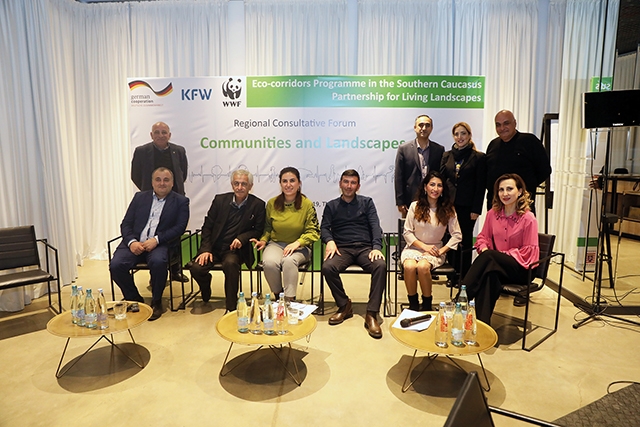Eco-Corridors Fund for the Caucasus Holds Final Meeting of Regional Consultative Forum
Eco-Corridors Fund for the Caucasus (ECF) held their final meeting of the Regional Consultative Forum in Tbilisi at the Hotel Moxy on November 26, the event marking the final formal gathering of the program. The meeting summed up and evaluated the successes of the start-up phase.
The ECF unites four countries and the meeting was attended by representatives from the German Federal Ministry for Economic Cooperation and Development (BMZ), KfW German Development Bank and World Wide Fund for Nature (WWF) Caucasus, as well as governmental delegates from Armenia, Azerbaijan and Georgia.
The meeting provided an overview of the ECF’s actions that have led to 19 conservation agreements between the WWF and local communities in Georgia, Armenia and Azerbaijan. The steps taken secure community-based conservation on 75,000 hectares of landscape.
Presentations were followed by a facilitated panel discussion involving representatives of participating local communities and independent experts. The discussion focused on the lessons learned through the program related to opportunities for community conservation of biodiversity and opportunities for sustainable socio-economic development of rural communities of the Caucasus based on nature conservation and sustainable use of resources.
The meeting only closed some doors to open others, as while the 26 November gathering concluded the beginning phase of the project, it also marked the commencement of the implementation phase.
“ECF is one of the most successful projects for WWF. It is new, innovative and the involvement of local people in nature protection is a key factor,” said Karen Manvelyan, WWF, Armenia.
ECF is a funding instrument supporting community-based biodiversity conservation in Georgia, Armenia and Azerbaijan. Eco-corridors connect various classifications of parks, protected areas and community-managed landscapes across the three countries. The organization uses simple steps and processes to engage communities in nature conservation, and what Mr. Hikmet Alizade from Azrbaijan’s Ministry of Environment noted is the best part of the program: “The best achievement of the project is the involvement of communities in conservation measures...this project turns communities into collaborators and sometimes friends.”
The result is an interconnected mosaic of managed and unmanaged habitats under various land categories and classifications. These community-managed landscapes protect, connect and support healthy native ecosystems while ensuring the socio-economic status of the communities is not diminished, and in many cases is improved.
The project is based on two parallel and interlinked processes: scientific identification then prioritization of critical eco-corridors and target species, and community-based approaches which develop trust, awareness, ownership and motivation for sustainable livelihood activities and long-term commitment for protection of these prioritized areas through conservation agreements implemented over a period of 10 years.
“First, the eco-corridors are important for the migration of species and the connection of protected areas,” said Juri Nosadze from the Ministry of Environmental Protection and Agriculture of Georgia. “Second, people’s social conditions are important. In the project it was very visible how it supports the environmental factors as well as the socio-economic situation. The local people are the main beneficiaries.”
The WWF decided to sign Conservation Agreements with local partners for a period of up to 10 years with clear, achievable objectives and easily measurable performance indicators. “Payments under these agreements will ensure that opportunity costs for biodiversity-focused management of land are covered, and that sustainable land use practises are applied,” reports the WWF.
By Nini Dakhundaridze
Image source: Nika Tsiklauri - EcoFilms.ge












